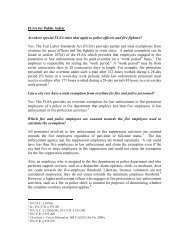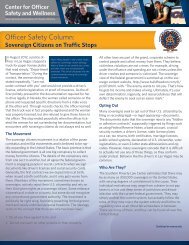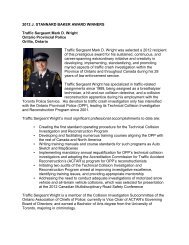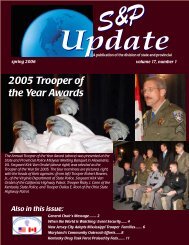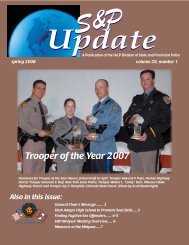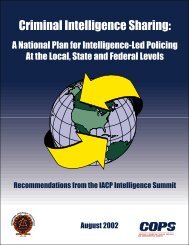President Steckler Letter to President Obama on Marijuana ...
President Steckler Letter to President Obama on Marijuana ...
President Steckler Letter to President Obama on Marijuana ...
Create successful ePaper yourself
Turn your PDF publications into a flip-book with our unique Google optimized e-Paper software.
Internati<strong>on</strong>al Associati<strong>on</strong> of<br />
Chiefs of Police<br />
515 North Washing<str<strong>on</strong>g>to</str<strong>on</strong>g>n Street<br />
Alexandria, VA 22314–2357<br />
Ph<strong>on</strong>e: 703-836–6767; 1-800-THE IACP<br />
Fax: 703-836–4543<br />
Web: www.theiacp.org<br />
<str<strong>on</strong>g>President</str<strong>on</strong>g><br />
Craig T. <str<strong>on</strong>g>Steckler</str<strong>on</strong>g><br />
Chief of Police<br />
Frem<strong>on</strong>t Police Department<br />
Frem<strong>on</strong>t, CA<br />
Immediate Past <str<strong>on</strong>g>President</str<strong>on</strong>g><br />
Walter A. McNeil<br />
Chief of Police<br />
Quincy Police Department<br />
Quincy, Florida<br />
First Vice <str<strong>on</strong>g>President</str<strong>on</strong>g><br />
Yousry “Yost” Zakhary<br />
Direc<str<strong>on</strong>g>to</str<strong>on</strong>g>r<br />
Woodway Public Safety<br />
Department<br />
Woodway, TX<br />
Sec<strong>on</strong>d Vice <str<strong>on</strong>g>President</str<strong>on</strong>g><br />
Richard Beary<br />
Chief of Police<br />
University of Central Florida<br />
Orlando, FL<br />
Third Vice <str<strong>on</strong>g>President</str<strong>on</strong>g><br />
R<strong>on</strong>al W. Serpas<br />
Superintendent of Police<br />
New Orleans Police Department<br />
New Orleans, LA<br />
Fourth Vice <str<strong>on</strong>g>President</str<strong>on</strong>g><br />
Terrence Cunningham<br />
Chief of Police<br />
Wellesley Police Department<br />
Wellesley, MA<br />
Vice <str<strong>on</strong>g>President</str<strong>on</strong>g> at Large<br />
Kent Barker<br />
Chief of Police<br />
Tualatin Police Department<br />
Tualatin, OR<br />
Vice <str<strong>on</strong>g>President</str<strong>on</strong>g> at Large<br />
James Craze<br />
Chief of Police<br />
Greenbelt Police Department<br />
Greenbelt, MD<br />
Internati<strong>on</strong>al Vice <str<strong>on</strong>g>President</str<strong>on</strong>g><br />
Nels<strong>on</strong> Werlang Garcia<br />
Chief, Community Policing & Human<br />
Rights Center<br />
Polícia Militar do Distri<str<strong>on</strong>g>to</str<strong>on</strong>g> Federal<br />
Brasilia, Brazil<br />
Vice <str<strong>on</strong>g>President</str<strong>on</strong>g>-Treasurer<br />
Dwight Henninger<br />
Chief of Police<br />
Vail Police Department<br />
Vail, CO<br />
General Chair Divisi<strong>on</strong> of State<br />
Associati<strong>on</strong>s of Chiefs of Police<br />
Peter Carnes<br />
Chief of Police<br />
S<str<strong>on</strong>g>to</str<strong>on</strong>g>nehill College Police & Safety<br />
Eas<str<strong>on</strong>g>to</str<strong>on</strong>g>n, MA<br />
General Chair Divisi<strong>on</strong> of State and<br />
Provincial Police<br />
Col<strong>on</strong>el Michael D. Edm<strong>on</strong>s<strong>on</strong><br />
Deputy Secretary, Public Safety Services<br />
Superintendent, Louisiana State Police<br />
Ba<str<strong>on</strong>g>to</str<strong>on</strong>g>n Rouge, LA<br />
Parliamentarian<br />
Ellen Hans<strong>on</strong> (retired)<br />
Chief of Police<br />
Lenexa Police Department<br />
Lenexa, KS<br />
Executive Direc<str<strong>on</strong>g>to</str<strong>on</strong>g>r<br />
Bart R. Johns<strong>on</strong><br />
Alexandria, VA<br />
Deputy Executive Direc<str<strong>on</strong>g>to</str<strong>on</strong>g>r<br />
Chief of Staff<br />
James W. McMah<strong>on</strong><br />
Alexandria, VA<br />
November 30, 2012<br />
<str<strong>on</strong>g>President</str<strong>on</strong>g> Barack <str<strong>on</strong>g>Obama</str<strong>on</strong>g><br />
United States of America<br />
The White House<br />
1600 Pennsylvania Ave, NW<br />
Washing<str<strong>on</strong>g>to</str<strong>on</strong>g>n, DC<br />
Dear <str<strong>on</strong>g>President</str<strong>on</strong>g> <str<strong>on</strong>g>Obama</str<strong>on</strong>g>:<br />
As president of the Internati<strong>on</strong>al Associati<strong>on</strong> of Chiefs of Police (IACP), I am writing<br />
you <str<strong>on</strong>g>to</str<strong>on</strong>g>day regarding the recent passage of laws in Colorado and Washing<str<strong>on</strong>g>to</str<strong>on</strong>g>n that will<br />
legalize marijuana. The IACP is str<strong>on</strong>gly opposed <str<strong>on</strong>g>to</str<strong>on</strong>g> these statutes and is extremely<br />
c<strong>on</strong>cerned that these states have passed laws that preempt federal law, which clearly<br />
classifies marijuana as an illegal substance.<br />
On September 21, 2012, the IACP and the Nati<strong>on</strong>al Sheriffs’ Associati<strong>on</strong> sent a letter<br />
<str<strong>on</strong>g>to</str<strong>on</strong>g> At<str<strong>on</strong>g>to</str<strong>on</strong>g>rney General Eric Holder expressing our c<strong>on</strong>cern about the proposed legislati<strong>on</strong> in<br />
Colorado, Oreg<strong>on</strong>, and Washing<str<strong>on</strong>g>to</str<strong>on</strong>g>n, asking him <str<strong>on</strong>g>to</str<strong>on</strong>g> speak out against the proposed<br />
legislati<strong>on</strong> as he previously did <strong>on</strong> Propositi<strong>on</strong> 19 in California. To date, we have not<br />
received a resp<strong>on</strong>se. The law enforcement community believes that the federal government<br />
must play a leadership role, weigh in <strong>on</strong> this issue, and also address many other issues<br />
surrounding the measures enacted in the states of Colorado and Washing<str<strong>on</strong>g>to</str<strong>on</strong>g>n.<br />
The IACP represents police executives worldwide and str<strong>on</strong>gly opposes the<br />
measures that were passed. The law enforcement community is greatly c<strong>on</strong>cerned with the<br />
negative c<strong>on</strong>sequences that laws such as those passed in Colorado and Washing<str<strong>on</strong>g>to</str<strong>on</strong>g>n will<br />
have <strong>on</strong> our citizens—especially the teenage and young adult populati<strong>on</strong>s.<br />
First and foremost, the IACP is extremely c<strong>on</strong>cerned about the negative impact<br />
legalized marijuana will have <strong>on</strong> highway safety. Those advocating legalizati<strong>on</strong> compare<br />
smoking marijuana <str<strong>on</strong>g>to</str<strong>on</strong>g> the equivalent of drinking a glass of wine or beer. However, most<br />
Serving the Leaders of Today, Developing the Leaders of Tomorrow
people who partake in an alcoholic drink do not do it for the purpose of impairment—this<br />
is not so with smoking marijuana. This obviously presents a huge problem <str<strong>on</strong>g>to</str<strong>on</strong>g> traffic safety.<br />
We have had great success in reducing drunk‐driving fatalities over the past several<br />
decades, partially because there is a nati<strong>on</strong>al standard of .08 blood alcohol c<strong>on</strong>tent (BAC).<br />
There is no such standard for marijuana impairment.<br />
Washing<str<strong>on</strong>g>to</str<strong>on</strong>g>n’s new law says that five nanograms of Tetrahydrocannabinol, or THC,<br />
per milliliter is the equivalent of the .08 standard limit, however Colorado has not yet set a<br />
standard. Standards in other states with medical marijuana legalizati<strong>on</strong>, like Ohio and<br />
Nevada, have set a two‐nanogram limit, while others have a zero‐<str<strong>on</strong>g>to</str<strong>on</strong>g>lerance standard. The<br />
lack of a standard has severe c<strong>on</strong>sequences <strong>on</strong> traffic safety and will cause wide c<strong>on</strong>fusi<strong>on</strong><br />
in our judicial system. As a result of these measures, law enforcement agencies will need<br />
further fr<strong>on</strong>tline training <strong>on</strong> drug impairment and additi<strong>on</strong>al drug recogniti<strong>on</strong> experts will<br />
also be needed. All at a time when law enforcement and municipal resources are at an alltime<br />
low.<br />
Further, do the laws preempt drug‐free workplace laws and how will employers<br />
address these competing laws? According <str<strong>on</strong>g>to</str<strong>on</strong>g> the Nati<strong>on</strong>al Highway Traffic Safety<br />
Administrati<strong>on</strong>, THC peaks during the act of smoking and within three hours generally falls<br />
<str<strong>on</strong>g>to</str<strong>on</strong>g> less than five nanograms per milliliter. Tests used in the workplace generally test for<br />
THC metabolites and differ from impairment testing. Any trace of THC metabolites,<br />
regardless of impairments, can be grounds for dismissal or discipline, based <strong>on</strong> a zero<str<strong>on</strong>g>to</str<strong>on</strong>g>lerance<br />
policy.<br />
However, with the new laws in Colorado and Washing<str<strong>on</strong>g>to</str<strong>on</strong>g>n, how can law enforcement<br />
or the private sec<str<strong>on</strong>g>to</str<strong>on</strong>g>r now enforce drug‐free workplace laws? Because it does not appear<br />
that either state has addressed this issue, it is highly likely that employers in these states<br />
who do try and enforce their drug‐free workplace policies could be subjected <str<strong>on</strong>g>to</str<strong>on</strong>g> litigati<strong>on</strong>.<br />
This is particularly troubling <str<strong>on</strong>g>to</str<strong>on</strong>g> law enforcement executives because, obviously, law<br />
enforcement officers are put in dangerous situati<strong>on</strong>s daily: we carry firearms, participate in<br />
pursuits, operate helicopters, and run SWAT teams. Will agencies within Colorado and<br />
Washing<str<strong>on</strong>g>to</str<strong>on</strong>g>n still be able <str<strong>on</strong>g>to</str<strong>on</strong>g> hire and fire officers based <strong>on</strong> marijuana use? Will law<br />
enforcement officers be able <str<strong>on</strong>g>to</str<strong>on</strong>g> break federal law and still retain their jobs?<br />
Additi<strong>on</strong>ally, IACP is c<strong>on</strong>cerned over several additi<strong>on</strong>al issues:<br />
<br />
<br />
<br />
Will there be increased criminal activity in or around the legal distributi<strong>on</strong> point?<br />
Will organized crime and/or cartels be involved? How will this be tracked? Will<br />
additi<strong>on</strong>al state and local resources be needed—and will federal law enforcement<br />
remain active in these areas?<br />
Will there be an influx of out‐of‐state c<strong>on</strong>sumers going <str<strong>on</strong>g>to</str<strong>on</strong>g> Colorado and Washing<str<strong>on</strong>g>to</str<strong>on</strong>g>n<br />
<str<strong>on</strong>g>to</str<strong>on</strong>g> purchase more than <strong>on</strong>e ounce of marijuana and how is this <str<strong>on</strong>g>to</str<strong>on</strong>g> be tracked and<br />
combated? With high taxati<strong>on</strong> rates, will an even greater robust black market<br />
blossom?<br />
How will law enforcement track whether or not there is an increase in juvenile use<br />
of marijuana in Colorado and Washing<str<strong>on</strong>g>to</str<strong>on</strong>g>n? Evidence indicates that states that have<br />
passed “medical” marijuana legislati<strong>on</strong> have seen an increase in usage by teenagers.<br />
These laws obviously send a message <str<strong>on</strong>g>to</str<strong>on</strong>g> youth that marijuana is harmless.<br />
Serving the Leaders of Today, Developing the Leaders of Tomorrow
The IACP has a l<strong>on</strong>g‐standing resoluti<strong>on</strong>, c<strong>on</strong>tinually voted <strong>on</strong> by our internati<strong>on</strong>al<br />
membership, which vigorously opposes any attempts <str<strong>on</strong>g>to</str<strong>on</strong>g> legalize or decriminalize<br />
marijuana.<br />
As such, the IACP is compelled <str<strong>on</strong>g>to</str<strong>on</strong>g> stand as the voice of reas<strong>on</strong>—as we, and the<br />
majority of the law enforcement community, disagree with the small number of individuals<br />
and organizati<strong>on</strong>s who support marijuana legalizati<strong>on</strong> and claim <str<strong>on</strong>g>to</str<strong>on</strong>g> speak for the entire law<br />
enforcement community. Unfortunately, these prop<strong>on</strong>ents have provided the public with<br />
unrealistic promises and misleading claims.<br />
The IACP is diligently working with the private sec<str<strong>on</strong>g>to</str<strong>on</strong>g>r and other partners <str<strong>on</strong>g>to</str<strong>on</strong>g> see how<br />
the issues above can be addressed by the law enforcement community, but the federal<br />
government must speak publicly as well. Our country needs your leadership <strong>on</strong> this issue<br />
and we look forward <str<strong>on</strong>g>to</str<strong>on</strong>g> hearing from you <strong>on</strong> the c<strong>on</strong>cerns outlined above.<br />
Sincerely,<br />
Chief Craig <str<strong>on</strong>g>Steckler</str<strong>on</strong>g><br />
<str<strong>on</strong>g>President</str<strong>on</strong>g><br />
Serving the Leaders of Today, Developing the Leaders of Tomorrow



